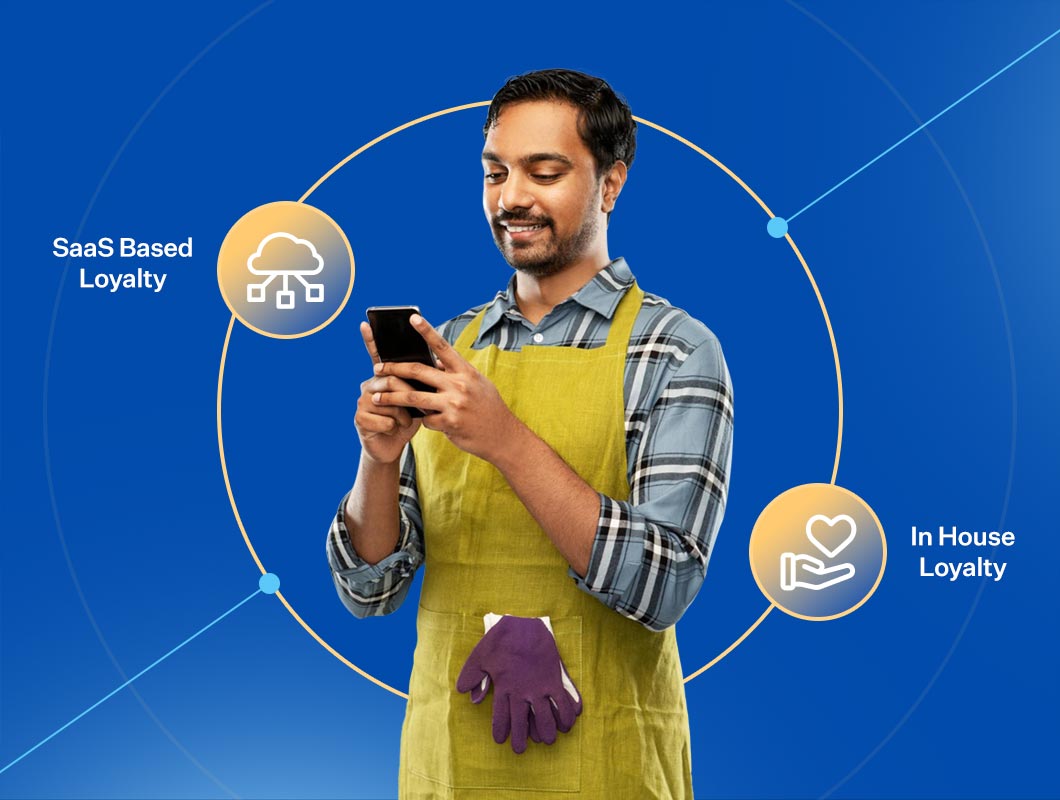August 22, 2025
Aug 22, 2025
SaaS vs In‑House Loyalty Programs: Why Basiq360’s SaaS Platform Gives You the Edge


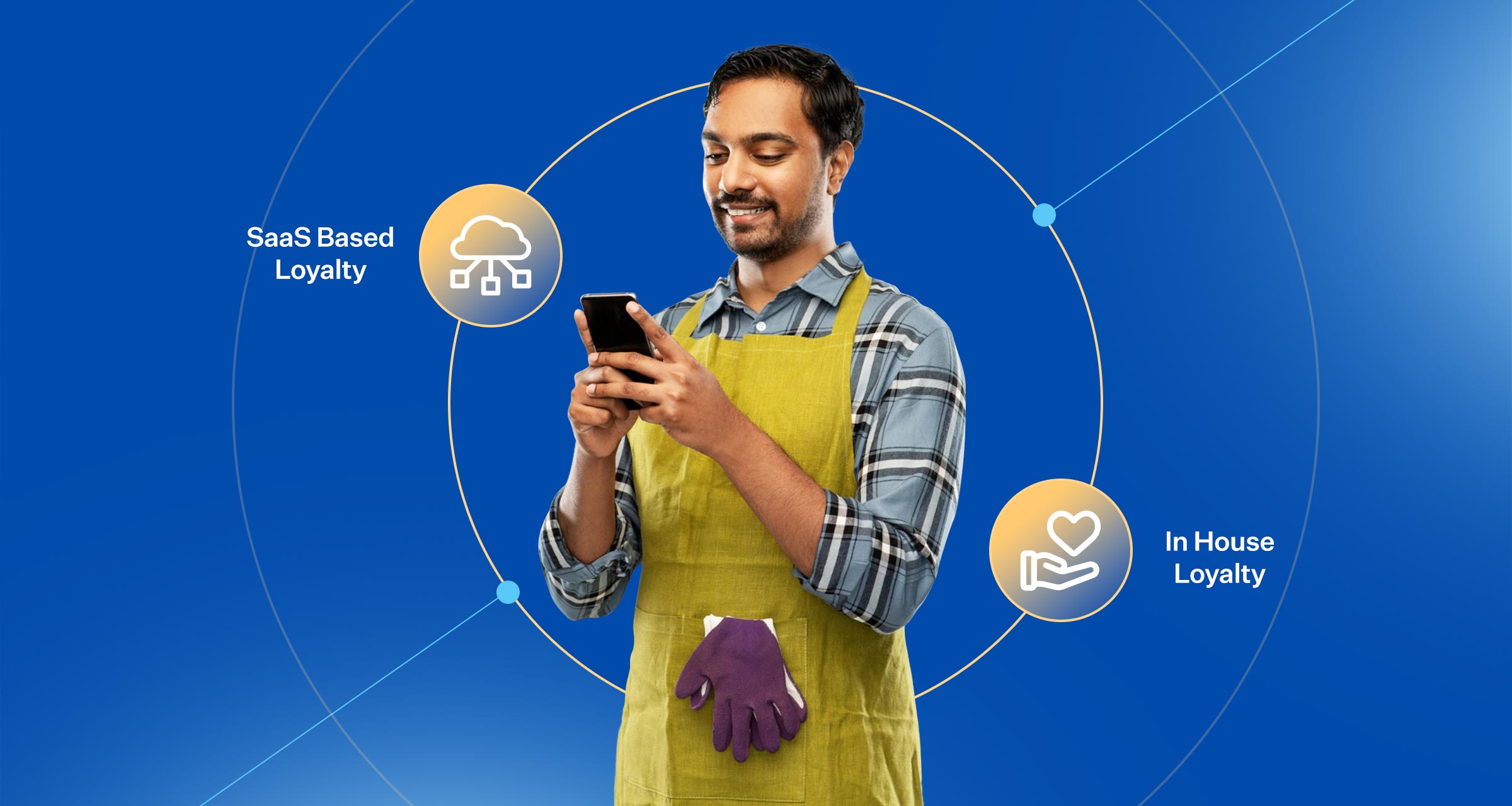
Introduction
Launching or upgrading a customer loyalty program is a strategic move for any growing business. Loyalty initiatives can boost customer retention, increase lifetime value, and turn customers into brand advocates. But before reaping these rewards, organizations face a crucial decision: build a loyalty solution in-house or adopt a SaaS-based loyalty platform. This choice isn’t just about software—it impacts your speed to market, budget, technical burden, and ultimately the success of your program.
Recent trends show many companies gravitating toward SaaS (Software-as-a-Service) loyalty platforms. In fact, the global loyalty management market is projected to soar from $15.19 billion in 2025 to $41.21 billion by 2032 (15.3% CAGR), with SaaS-based solutions driving much of this growth due to their speed, scalability, and ease of deployment. Clearly, SaaS loyalty platforms are becoming the preferred choice for modern loyalty initiatives.
This comprehensive guide will compare SaaS-based loyalty platforms versus in-house loyalty solutions. We’ll break down the pros and cons of each approach and highlight why Basiq360’s SaaS loyalty capabilities excel in delivering rapid, scalable results. If you are a marketing leader, CX manager, or business decision-maker evaluating loyalty program options, read on for an authoritative look at your choices – and actionable tips to make the best decision.
SaaS-Based Loyalty Platforms: Fast-Track to Results
SaaS-based loyalty platforms are cloud-based solutions provided by a third-party vendor (like Basiq360) that you can configure and use out-of-the-box. These platforms are gaining popularity because they dramatically reduce the time and effort to launch a high-impact loyalty program. Instead of building from scratch, you leverage a platform already built to scale and adapt.
Key advantages of SaaS loyalty platforms include:
- Rapid Deployment: You can launch a loyalty program in weeks, not months. Pre-built modules and workflows let you configure program rules and go live quickly. Many businesses using SaaS loyalty software go to market in under 4–6 weeks, whereas custom builds can take 6–12+ months. Fast deployment means you start capturing ROI and customer data sooner.
- ⚙️ No-Code Configuration: Modern SaaS platforms offer no-code or low-code configurability, so marketing and CX teams can modify rewards, tiers, and program rules through an intuitive admin dashboard without writing code. Basiq360, for example, allows you to set up points, tiers, bonus rules, and more via easy interfaces – empowering you to adjust strategy on the fly without IT bottlenecks.
- 🔄 Continuous Feature Updates: With SaaS, you automatically benefit from the provider’s ongoing innovations. Basiq360 and other top platforms push regular upgrades and new features driven by market trends (e.g. new reward mechanisms, AI-driven insights) to all clients. You’re never stuck with outdated software; your loyalty program evolves with the times at no extra development cost to you.
- 📈 Robust Analytics & Insights: SaaS loyalty solutions come with built-in analytics dashboards to track engagement, redemptions, and ROI in real time. For instance, Basiq360 provides real-time reporting on points earnings, partner performance, and campaign effectiveness out-of-the-box. These data insights allow you to continuously optimize your program and demonstrate its impact to stakeholders.
- 🌐 Scalability & Accessibility: A cloud loyalty platform is designed to scale effortlessly as your user base grows or your needs expand. Whether you’re adding new customer segments, launching in new regions, or integrating additional channels, a SaaS solution handles it without major rework. Moreover, top platforms offer multilingual, mobile-friendly user experiences from day one, so your loyalty program is accessible to diverse audiences across web and mobile.
- 🤝 Less IT Dependency, More Focus on Strategy: Because the SaaS provider manages the infrastructure, security, and maintenance, your internal tech teams have minimal ongoing burden. Updates, server uptime, and bug fixes are handled by the vendor. This frees your marketing and CX teams to focus on strategy, personalization, and building customer relationships rather than worrying about building or fixing tools. As one industry report notes, SaaS loyalty platforms “allow teams to shift focus from building tools to actually growing engagement and refining incentives”.
These benefits explain why SaaS-based loyalty platforms have overtaken bespoke solutions for many companies. With a solution like Basiq360’s Loyalty Management System, you get all these advantages along with enterprise-grade features tailored for loyalty success. We’ll dive deeper into Basiq360’s strengths shortly, but first, let’s consider the alternative path: building a loyalty platform in-house.
In-House Loyalty Solutions: Control Comes at a Cost
Some organizations consider developing their loyalty program software in-house or via internal IT teams. An in-house build means you create a custom application or extend your existing systems (CRM, e-commerce, etc.) to support loyalty program mechanics unique to your business. This route can make sense for companies with extremely specialized requirements or strict governance needs. However, it’s important to go in with eyes open to the challenges.
Advantages of an in-house loyalty system:
- 🏢 Complete Control: You have full authority over the system’s architecture, data, and user experience. Every aspect – from the rewards logic to the branding of the user interface – can be tailored exactly to your specifications. There are no limitations imposed by a third-party platform’s design.
- 🔧 Deep Customization: If your loyalty strategy involves highly unique rules or integrations, an in-house build lets you hard-code these custom workflows. For example, you might tightly embed loyalty features into a proprietary mobile app or internal platform in ways a generic SaaS might not support out-of-the-box. Companies sometimes choose in-house development when they believe their business model is so unique that a one-size-fits-all platform won’t suffice.
- 🔐 Internal Data Governance: All customer and transaction data stays within your own IT environment, under your direct governance. For organizations with extreme data security or compliance policies, this control can be appealing (though note: leading SaaS providers also offer enterprise-grade security and compliance measures, as discussed later).
Despite these benefits, building your own loyalty solution comes with significant limitations and risks:
- ⏳ Long Development Timelines: Crafting a full-featured loyalty platform from scratch is a major software project. It often takes 6-12 months or more to develop and deploy, even for experienced teams. One loyalty expert notes that building in-house can require over a year of development with significant investment. If you need to launch quickly to capitalize on market opportunities or catch up with competitors, such a delay can be a deal-breaker.
- 💸 High Upfront and Ongoing Costs: In-house development entails heavy costs in engineering time, project management, testing, and infrastructure. You’ll likely need to hire or allocate a dedicated team of developers, QA testers, DevOps, and support personnel for the build and ongoing maintenance. Beyond the initial build, continuous investment is needed to fix bugs, add features, and scale the system. These expenses can easily outweigh the cost of a subscription to a proven SaaS platform.
- 🔄 Maintenance & Support Burden: When you own the solution, you own all the upkeep – security patches, server maintenance, uptime monitoring, and user support. Every time a software library needs updating or a vulnerability is discovered, your team must handle it. As one analysis put it, engineers can end up diverting significant bandwidth to simply “keeping the lights on,” detracting from other innovations. In contrast, a SaaS provider like Basiq360 handles all back-end maintenance and provides technical support, so your internal teams aren’t firefighting platform issues.
- 🐌 Limited Agility: Marketing is dynamic – you may want to experiment with new promotions, tweak program rules, or integrate a new channel quickly. In an in-house system, any feature change or update must go through a development cycle. Rolling out new capabilities can be slow and require reprioritizing the dev queue. This limited agility makes it harder to respond to customer feedback or market trends in real time. For example, adding a gamification feature or new integration to your custom platform might take months of coding, whereas SaaS platforms might offer it immediately or via a simple configuration.
- 🤹 Hidden Operational Complexities: Running a loyalty program touches many aspects of your business – IT, marketing, finance (rewards budget), data compliance, etc. In-house solutions often incur hidden costs and complexities that teams underestimate. These can include training staff to use the new system, managing downtime or bugs, building third-party integrations, and ensuring compliance with evolving data privacy laws on your own. Without experienced guidance, it’s easy to miss critical considerations (for example, fraud prevention measures or GDPR compliance mechanisms) that a seasoned SaaS provider would have baked in by default.
In summary, while an in-house approach offers control and customization, it comes with substantial drawbacks in time, cost, and ongoing effort. Only organizations with very unique requirements and significant internal resources tend to succeed with a proprietary build. Even then, many eventually find the maintenance and scalability challenges tough to sustain.
Most businesses – especially mid-size to enterprise companies looking for robust loyalty capabilities – are finding that a SaaS-based platform strikes a better balance. Next, let’s directly compare how SaaS and in-house stack up on key criteria.
Head-to-Head: SaaS vs In-House Loyalty Solutions
To make an informed choice, it helps to see a side-by-side comparison of critical factors. Below is a breakdown of SaaS-based loyalty platforms versus building in-house:
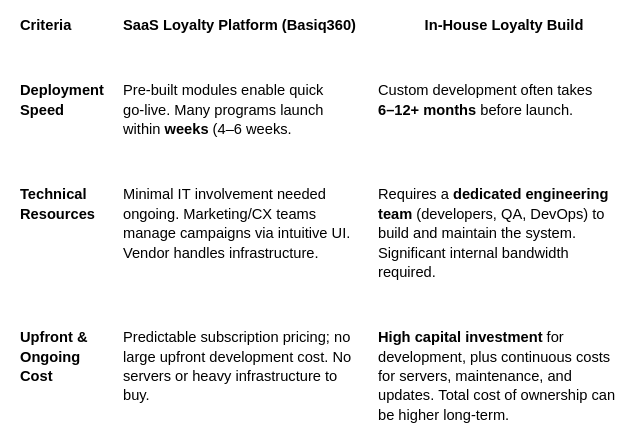
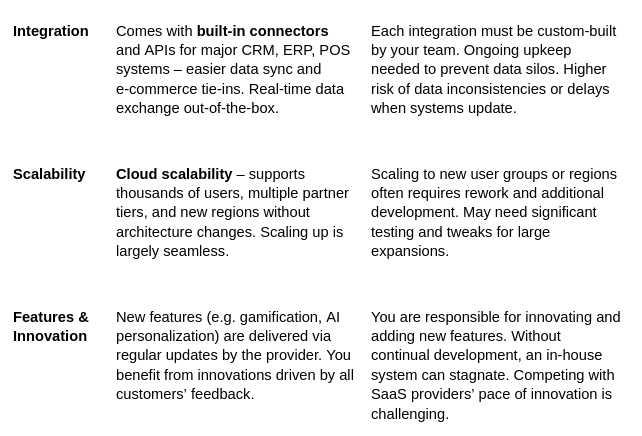
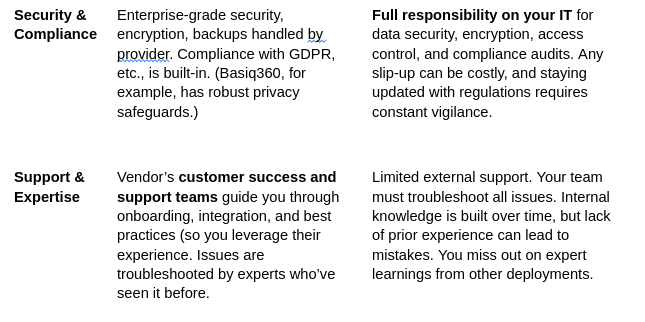
Table: Comparing SaaS-based loyalty platforms like Basiq360 with in-house loyalty program development across key factors.
As the comparison shows, a SaaS platform delivers speed, flexibility, and enterprise capabilities without the heavy lifting on your part. In contrast, in-house development requires significant time and technical investment, and it can leave your marketing team waiting on engineering for every little change.
To further illustrate, consider integration – a critical success factor for loyalty programs. A loyalty platform must connect with systems like your CRM, POS, e-commerce site, maybe an ERP or marketing automation tool, to track customer activity and reward triggers. SaaS solutions shine here: they’re designed to plug into your tech stack with APIs and pre-built connectors. For example, Basiq360 offers seamless integration with ERP and CRM systems (one client integrated Basiq360 with SAP Business One to sync data, significantly smoothing operations). By contrast, an in-house system means writing custom code for each integration and maintaining it as those external systems evolve. It’s easy for data flows to break or become inconsistent if you lack the resources to constantly manage these connectors.
Actionable Tips to Evaluate Your Loyalty Solution Options
Choosing between a SaaS platform and an in-house solution should align with your business’s specific circumstances. Here are some practical evaluation tips and questions to guide your decision-making:
- Assess Your Timeline for Launch: If you have an aggressive timeline (e.g., a campaign in the next quarter or a competitive imperative), a SaaS platform is likely the better fit. You can be up and running quickly. If you have over a year and a half to dedicate and no urgency, in-house could be considered – but few fast-paced businesses have that luxury.
- Evaluate Internal Tech Bandwidth: Do you have a software engineering team with capacity and experience in building loyalty or CRM systems? If not (or if your IT team is already stretched thin), lean toward SaaS. SaaS significantly reduces dependency on internal IT, enabling marketing and CX teams to manage the program themselves. Your tech team will thank you for not adding a massive development project to their plate.
- Consider Total Cost of Ownership: Go beyond initial costs and project the 5-year TCO for each option. In-house development isn’t “free” just because you have engineers on payroll – it incurs opportunity cost and likely requires new hires or contractors. Remember to factor in maintenance, servers/cloud costs, and updates. Many firms find that SaaS subscription costs are far more predictable and often lower over time than building and sustaining a custom platform. Basiq360’s pricing, for example, covers hosting, support, and updates, whereas an in-house build would need continuous funding for those elements.
- Identify Your Customization Needs: List the unique features or workflows you absolutely require. Then verify if a SaaS platform can accommodate them through configuration or minor extensions. Modern loyalty SaaS (like Basiq360) is quite flexible – supporting points, tiers, cashback, referrals, gamification, partner rewards, and more out-of-the-box. Unless your needs are truly one-of-a-kind, there’s a good chance a SaaS solution can fulfill them without custom development, using configuration settings or open APIs. Don’t underestimate the configurability of platforms – for instance, Basiq360 allows customizing bonus schemes by time period, product category, region, or user segment easily via its dashboard.
- Examine Integration Requirements: Map out which systems your loyalty program must connect with (e.g. POS for in-store point accrual, e-commerce site, mobile app, CRM for customer data, etc.). If the list is long or complex, a SaaS platform with proven connectors and API support is invaluable. Basiq360 is built with integration in mind – it connects seamlessly with CRM, POS, dealer management systems and more, and even offers SDKs for mobile integration. If you tried in-house, integrating all those systems would be one of the hardest and most time-consuming tasks. Consider also future integrations (maybe you’ll add a mobile wallet or a new data warehouse) and how a SaaS platform’s extensibility can support that.
- Think About Scalability & Future Growth: What’s your vision for the loyalty program 2-3 years down the line? Will you expand it to new regions or millions of users? Will you incorporate new engagement methods (like QR code scans, partner incentives, etc.)? Scaling an in-house solution to meet new demands could require significant rework or even a rebuild. On the other hand, a SaaS platform like Basiq360 is cloud-based and proven in large-scale deployments – for example, Basiq360 supported one client in onboarding 77,000+ dealers onto a unified loyalty and distribution ecosystem. That kind of scalability is hard to achieve alone. If high growth and flexibility are goals, leaning SaaS is prudent.
- Prioritize Security and Compliance: Customer loyalty programs generate sensitive data – personal info, purchase histories, maybe financial details for rewards. If you build in-house, ask if you have the expertise to handle encryption, secure storage, and compliance with regulations (GDPR, CCPA, etc.). A reputable SaaS provider will have these covered with enterprise-grade security protocols and compliance certifications. For instance, Basiq360 implements data encryption, access controls, audit logs, and GDPR-compliant practices as part of the service. Using SaaS can thus mitigate security risks, whereas going in-house means you assume all those responsibilities and liabilities.
- Factor in Support & Know-How: Launching a loyalty program involves strategy and operational know-how, not just technology. When you use Basiq360 SaaS, you also gain a strategic partner – their customer success team and solution experts will guide you through best practices, share industry insights, and help configure the program for success. Basiq360 prides itself on providing “end-to-end support and customization per industry needs” as you launch and grow. Plus, their clients frequently praise the responsive support; for example, the IT Head of Kelvin Pipes noted that Basiq360’s integration with SAP was smooth and the support team “responsive and knowledgeable,” helping improve productivity across the board. If you build in-house, you won’t have that external expertise to draw on – you’re essentially on your own to figure out what works best. Especially for your first loyalty program or a major overhaul, having experienced partners (like Basiq360) can significantly de-risk the initiative.
By systematically evaluating these factors, you’ll likely find that a SaaS solution checks the most boxes for delivering a successful loyalty program with minimal hassle. Next, let’s zero in on Basiq360’s capabilities and how they align with these advantages.
Basiq360’s SaaS Loyalty Platform: Built for Speed, Scale, and Success
Basiq360 is a leading loyalty management platform that encapsulates all the benefits of SaaS while providing powerful, enterprise-grade loyalty features. Choosing Basiq360 means you’re not just licensing software – you’re gaining a partner with deep expertise in customer and channel loyalty. Here’s how Basiq360 stands out as a SaaS loyalty provider:
- Rapid Deployment & Easy Setup: Basiq360 enables you to configure and launch a tailored loyalty program in a matter of weeks. The platform comes with pre-built components for points programs, tiered rewards, referral bonuses, and more, so you don’t waste time reinventing the wheel. Its no-code configurability means you can define program rules, point values, tier thresholds, and reward catalogs through a user-friendly interface. One of Basiq360’s strengths is quick pilot launches – you can roll out a pilot in a specific region or with a subset of customers, gather feedback, and then scale up rapidly across your entire network. This agile approach lets you prove value early and expand with confidence.
- Seamless Integration with Your Stack: Basiq360 was designed to play nicely with your existing business systems. It offers integrations for CRM, ERP, POS, and e-commerce platforms so that loyalty data flows wherever it’s needed. For example, Basiq360 has integrated with SAP and other ERP solutions in client deployments to ensure sales and loyalty data synchronize in real-time. The platform provides open APIs and even QR code support to connect online and offline activities. Whether you need your loyalty program data in your Salesforce CRM or want to trigger rewards based on POS transactions, Basiq360 makes it straightforward – without your developers writing custom code for each connection.
- Scalability Proven in Enterprise Scenarios: Built on a robust cloud infrastructure, Basiq360 can scale from a small pilot to a nationwide program with millions of transactions. Many mid-size and enterprise companies trust Basiq360 to run their loyalty and incentive programs across large dealer or customer networks. A notable example is Okaya, a battery manufacturer, where Basiq360 helped build a unified loyalty and distribution ecosystem onboarding over 77,000 dealers and retailers. Despite that massive scale of users and data, the program runs smoothly with real-time tracking and no performance hiccups. Whether you operate in one country or twenty, Basiq360 can scale with your growth, handling multiple geographies, languages, and partner tiers effortlessly.
- No-Code Customizability & Flexibility: While being a standardized platform, Basiq360 is far from one-size-fits-all. It offers extensive configuration options to tailor the program to your industry and goals. You can customize reward schemes based on time periods (e.g. seasonal promotions), products or categories, geographic regions, or user roles – all through the admin dashboard. The platform supports various program structures like points-based, tiered loyalty levels, gamified challenges, referral incentives, and more. For instance, you can easily set up a tiered program where partners or customers advance to higher tiers with extra perks based on their purchases, or create gamified campaigns (like a “Spin & Win” game) to boost engagement. This level of flexibility rivals what you could custom-build, but at a fraction of effort. Basiq360 essentially gives you a toolbox to assemble a program unique to your brand without needing to code those features from scratch.
- Comprehensive Feature Set (Out-of-the-Box): One big advantage of Basiq360 is that it bundles all the advanced features you’d want in a modern loyalty program, ready to use. Some highlights include:
- QR Code–Based Points Capture: Perfect for channel or offline scenarios, Basiq360 enables quick point earning by scanning QR codes on products or invoices. This has been a game-changer for companies incentivizing distributors or retail partners – it makes point collection effortless and reduces fraud (each QR code is unique and tracked). Building such a feature in-house would be complex, but Basiq360 gives it to you out-of-the-box.
- Multi-Channel Redemption Options: Basiq360 supports instant redemption of points for wallets, vouchers, bank transfers, or merchandise. For example, in the Indian market, it integrates with Paytm and UPI for cash-like redemptions. This kind of ready integration makes rewards more appealing and convenient. Your loyalty members can redeem in the way that best motivates them, without you having to manually fulfill rewards.
- White-Label Mobile App: In today’s mobile-first world, Basiq360 offers white-label loyalty mobile apps that carry your branding. The app allows members (or partners) to track their points, browse rewards, and get notifications – all in real time. Instead of spending months building a loyalty app, you can deploy Basiq360’s app customized to your brand in short order. It’s a huge win for user experience and engagement.
- Real-Time Analytics & AI Insights: The platform’s dashboard gives you real-time visibility into every facet of your program – registrations, active users, points issued, rewards redeemed, top performing segments, etc.. Basiq360 also leverages analytics (and AI where applicable) to help identify trends and opportunities. For example, you might see that a certain region has low engagement and then target a special promotion there. These data-driven insights ensure you maximize ROI and keep improving the program. An in-house solution would require a whole analytics build-out to approach this level of reporting.
- QR Code–Based Points Capture: Perfect for channel or offline scenarios, Basiq360 enables quick point earning by scanning QR codes on products or invoices. This has been a game-changer for companies incentivizing distributors or retail partners – it makes point collection effortless and reduces fraud (each QR code is unique and tracked). Building such a feature in-house would be complex, but Basiq360 gives it to you out-of-the-box.
- Robust Security and Fraud Prevention: Basiq360 understands that trust is the foundation of any loyalty program. The platform includes robust security measures – data encryption, secure access controls, audit logs – to protect sensitive customer and transaction data. It also has built-in fraud prevention tools, such as unique QR code tracking and instant alerts for suspicious activity, to safeguard against abuse of the program. These protections are baked into the service, relieving you of having to engineer them yourself. This is especially valuable for enterprise clients concerned with compliance and fraud risk. With Basiq360, you can be confident that your loyalty currency is secure and your customer data is handled responsibly.
- Dedicated Customer Success & Support: Finally, when you partner with Basiq360, you gain access to a dedicated customer success team that ensures you achieve your program goals. From day one, Basiq360’s experts will work with your team on program design, configuration, and rollout. They provide training, share best practices gleaned from successful programs in various industries, and remain on-call to help with any issues or ideas. Clients frequently commend Basiq360’s support – describing it as “one-click solution” fast and extremely helpful. For example, after two years of using Basiq360, Bonus Locks’ sales head noted the team is “offering great support” whenever needed. This level of partnership is something you simply don’t get with a DIY approach. Basiq360 aligns its success with yours – when your loyalty program thrives, so do they.
In short, Basiq360 encapsulates the best of what a SaaS loyalty platform can offer: speed of deployment, ease of integration, scalable architecture, rich features, and knowledgeable support. It’s a solution crafted from years of experience across industries – so you don’t have to learn the hard lessons yourself.
Conclusion: Partner with Basiq360 for Loyalty Program Success
Designing a loyalty program that engages customers (or channel partners) and drives meaningful business results is a complex endeavor. The last thing you need is the added complexity of building and maintaining the software infrastructure from scratch. SaaS-based loyalty platforms have emerged as the strategic choice for companies that want to launch quickly, innovate rapidly, and minimize risk. They allow you to focus on crafting the right rewards and experiences, while the platform handles the heavy lifting behind the scenes.
Between the two approaches, SaaS offers clear advantages in speed, cost-efficiency, agility, and support, as we’ve detailed. And when it comes to SaaS loyalty providers, Basiq360 stands out as a proven partner for mid-size and enterprise firms alike. With Basiq360, you gain more than technology – you gain a team that’s committed to your loyalty program’s success, from initial planning to ongoing optimization. The platform’s rapid deployment, no-code flexibility, seamless integrations, and powerful features make it an ideal choice for organizations looking to elevate their customer engagement without the headache of a long IT project.
Ready to transform your loyalty strategy with a partner you can trust? Basiq360’s experts are here to help you design and launch a loyalty program that delights your customers and accelerates growth. Don’t settle for being just another option in the market – with Basiq360’s loyalty platform, you can become the brand that customers keep coming back to, again and again.
Take the next step toward loyalty success –basiq360.comBook a free demo with Basiq360 today, and see how our SaaS loyalty solution can future-proof your customer loyalty and rewards program. Let’s build loyalty together and drive lasting growth for your business.

Related Blogs
Explore expert tips, industry trends, and actionable strategies to help you grow, and succeed. Stay informed with our latest updates.


